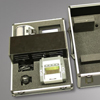Civil ID
National ID or eID programs are implemented in many countries by issuance of identity (smart) cards to citizens. Biometric technologies are often added to avoid multiple registrations by the same person. During the life cycle of the ID card a biometric identifier can further be used for unique authentication of the card owner.
In general a unique national ID is introduced to give the growing population access to a wide range of public services such as social benefit programs, healthcare and elections. Especially where countries lacks a solid central administration of its population, governments can benefit with an eID as a strong tool for population control.
Civil ID are similar programs where governments do want to issue unique ID to control benefits and avoid identity fraud for specific groups in society like refugees, civil servants or farmers. In these programs it is not always necessary to issue ID cards, but identification based on biometrics can at least avoid multiple registrations. It avoids identity fraud.
False identities are used for criminal activities worldwide. Stealing someone’s identity is a big intrusion of the privacy with major consequences for legal and financial transactions. Identity checks can be extended with biometrics to ensure the unique ID to prevent identity fraud.
HSB identification has worked on several successful civil ID programs in different parts of the world. Our capabilities are solutions, including hardware and software, for biometric registration, identification and verification. This also includes central repositories to match multiple identities.
Read more about our completed and current projects


